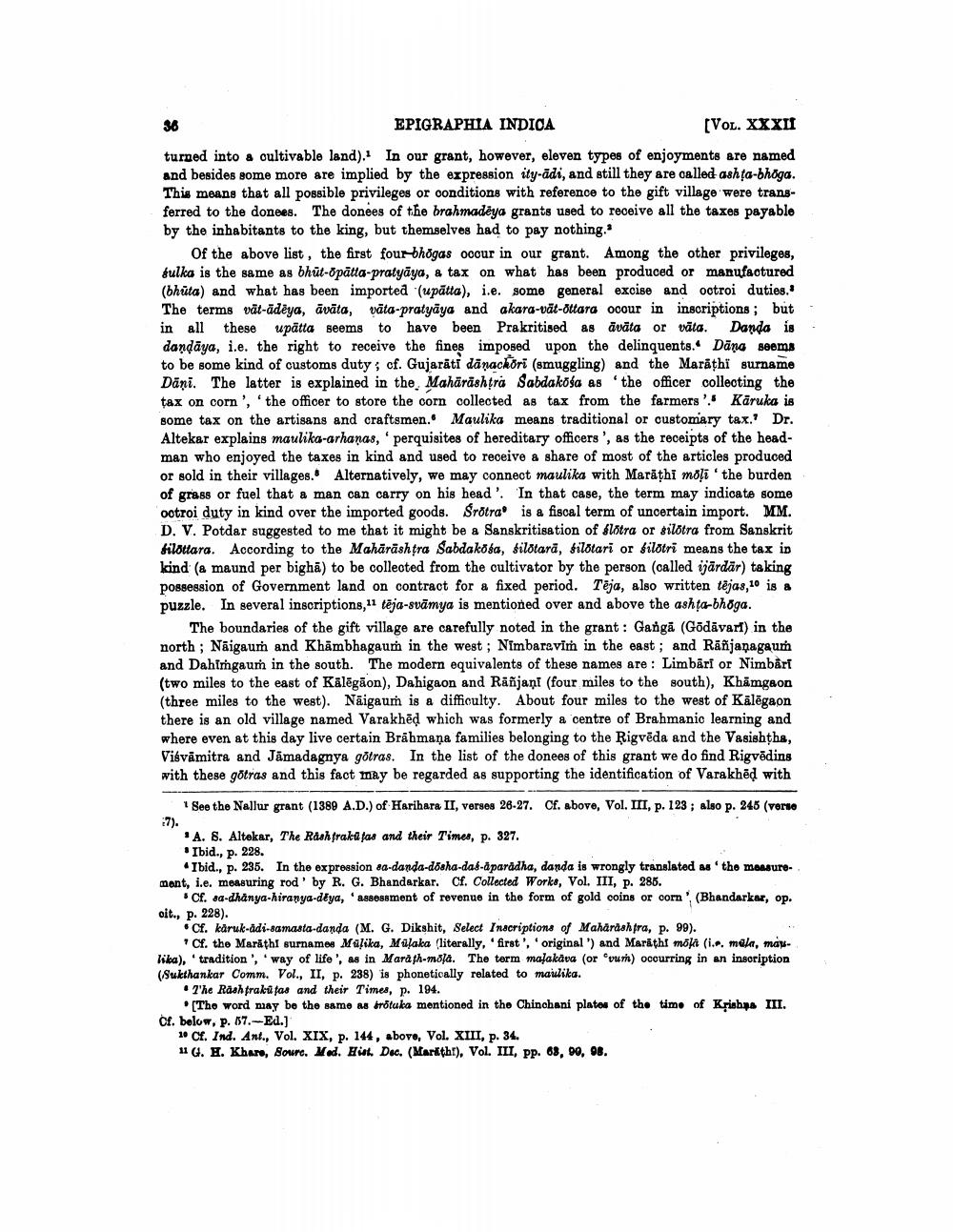________________
EPIGRAPHIA INDICA
(Vol. XXXII turned into a cultivable land). In our grant, however, eleven types of enjoyments are named and besides some more are implied by the expression ity-ādi, and still they are called ashța-bhoga. This means that all possible privileges or conditions with reference to the gift village were transferred to the donces. The donees of the brahmadēya grants used to receive all the taxes payable by the inhabitants to the king, but themselves had to pay nothing."
Of the above list, the first four bhogas occur in our grant. Among the other privileges, sulka is the same as bhut-Opätta-pratyāya, & tax on what has been produced or manufactured (bhūta) and what has been imported (upātta), i.e. some general excise and octroi duties. The terms vāt-ādēya, āvāta, võta-pratyāya and akara-vät-ottara ocour in inscriptions; but in all these upătta seems to have been Prakritised as āvāta or vāta. Danda is. dandāya, i.e. the right to receive the fines imposed upon the delinquents. Dāna seems to be some kind of customs duty; cf. Gujarāti dānackori (smuggling) and the Marathi surname Dāni. The latter is explained in the Mahārashtra Sabdakosa as the officer collecting the tax on corn', 'the officer to store the corn collected as tax from the farmers'.! Käruka is some tax on the artisans and craftsmen. Maulika means traditional or customary tax. Dr. Altekar explains maulika-arhanas, perquisites of hereditary officers', as the receipts of the headman who enjoyed the taxes in kind and used to receive a share of most of the articles produced or sold in their villages. Alternatively, we may connect maulika with Marathi moļi 'the burden of grass or fuel that a man can carry on his head'. In that case, the term may indicate some octroi duty in kind over the imported goods. Srotra® is a fiscal term of uncertain import. MM. D. V. Potdar suggested to me that it might be a Sanskritisation of flótra or silotra from Sanskrit filottara. According to the Mahārāshtra Sabdakota, silotarā, filotari or silotri means the tax ip kind (a maund per bighā) to be collected from the cultivator by the person (called ijārdār) taking possession of Government land on contract for a fixed period. Tēja, also written tëjas, 10 is a puzzle. In several inscriptions, 11 tēja-svāmya is mentioned over and above the ashta-bhoga.
The boundaries of the gift village are carefully noted in the grant : Gangā (Gödāvar) in the north; Näigaum and Khambhagaum in the west ; Nimbaravin in the east; and Rāñjanagaum and Dahimgaum in the south. The modern equivalents of these names are: Limbări or Nimbari (two miles to the east of Kälēgāon), Dahigaon and Rāñjani (four miles to the south), Khāmgaon (three miles to the west). Nāigaum is a difficulty. About four miles to the west of Kālēgaon there is an old village named Varakhēd which was formerly a centre of Brahmanic learning and where even at this day live certain Brāhmaṇa families belonging to the Rigvēda and the Vasishtha, Vibvāmitra and Jāmadagnya götras. In the list of the donees of this grant we do find Rigvēdins with these gotras and this fact may be regarded as supporting the identification of Varakhēd with
See the Nallur grant (1389 A.D.) of Harihara II, verses 26-27. Cf. above, Vol. III, p. 123 ; also p. 245 (verso 7).
1A. 8. Altekar, The Rashtrakūtas and their Times, p. 327. Ibid., p. 228.
Ibid., p. 235. In the expression sa-danda-dosha-das-aparadha, danda is wrongly translated as the measuremant, i.e. measuring rod' by R. G. Bhandarkar. Cf. Collected Works, Vol. III, p. 285.
Cf. sa-dhanya-hiranya-deya, ' assessment of revenue in the form of gold coins or corn (Bhandarkar, op. cit., p. 228).
. Cf. karuk-adi-samasta-danda (M. G. Dikshit, Select Inscriptions of Maharashtra, p. 99).
Cf. the Marathi surnames Mālika, Mülaka (literally, 'first','original ') and Marathi mola (ir. müla, maylika), tradition', 'way of life', as in Marath-mala. The term malakava (or vur) occurring in an inscription (Sukthankar Comm. Vol. II, p. 238) is phonetically related to maulika.
• 7'he Rashtrakūtas and their Times, p. 194.
[The word may be the same as drotuka mentioned in the Chinchani platos of the time of Krishna III. Cf. below, p. 67.-Ed.)
10 Cf. Ind. Ant., Vol. XIX, p. 144, above, Vol. XIII, p. 34. 11 G. H. Khar, Sourc. Med. Hist. Doc. (Marithi), Vol. III, PP. 68, 90, 98.




